Vasculitis Treatment Market Research, 2031
The global vasculitis treatment market was valued at $250.1 million in 2021, and is projected to reach $350.1 million by 2031, growing at a CAGR of 3.4% from 2022 to 2031. Vasculitis is defined as the inflammation of the blood vessels such as veins, capillaries and arteries. Inflammation may cause blood vessel walls to thicken, decreasing the diameter of the blood vessel's entry. The various types of vasculitis are grouped according to the size of the blood vessels they affect. There are several side effects that might arise from blood vessel inflammation, including blockage of blood flow, which could render organ damage. Some of the symptoms that have been identified are fatigue, weakness, weight loss, muscle soreness, congestive heart failure, and malaise. Numerous medications are used as therapy options, including corticosteroids, immunosuppressants, and cytotoxic agents.
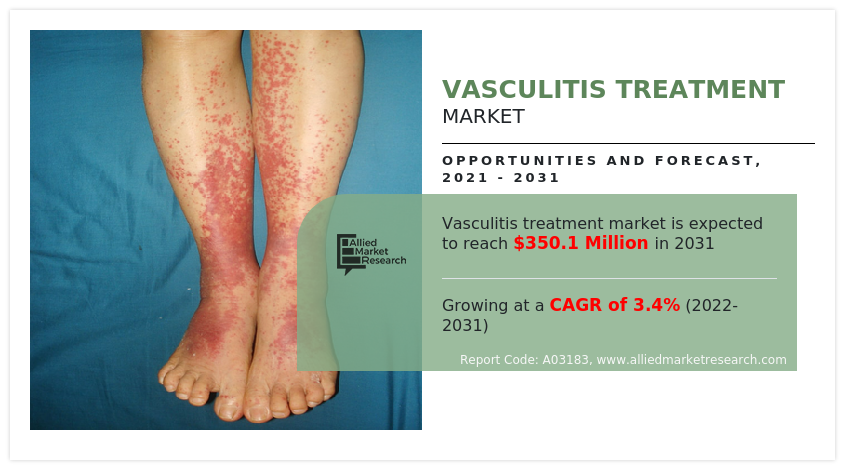
The vasculitis treatment market is expanding as there is upsurge in vasculitis prevalence and its treatment. In addition, the rise in prevalence of chronic diseases, which has increased demand for vasculitis drugs is anticipated to fuel the growth of the vasculitis treatment market. Proteins that regulate the function of other proteins and cellular processes can be found in biologic goods, as can genes that direct the creation of essential proteins, modified human hormones, or cells that create substances that either stimulate or suppress immune system components. There is active research and development going on in the biologics sector. The success rates of clinical trials for biologics have increased as a result of these research and development efforts.
Moreover, increase in adoption rate of biologics, and its development by key players favors vasculitis treatment market opportunity. Increase in corticosteroids consumption has directly had a beneficial impact on the market as a result of expanding healthcare access and industry advancements. However, the potential negative effects of using corticosteroids is expected to restrain the vasculitis treatment market growth.
The per capita income of individuals in developing countries has increased, which is escalating the sale of products, thereby boosting the growth of the market. The revenue generated from developing countries has increased considerably over the years, owing to a rise in awareness toward immunosuppressant drugs. Moreover, the improving access to healthcare coupled with developments in the healthcare sector has increased the consumption of drugs, thereby directly creating a positive impact on the market.
Impact of COVID-19
The COVID-19 pandemic is predicted to have a negative impact on the growth of the global vasculitis treatment market in the short term. Moreover, throughout the pandemic, due to the recommendations to maintain social distance, many individuals treated their illnesses via self-medication or other unconventional methods. However, due to decrease in COVID patients, the market is anticipated to rise during the vasculitis treatment market forecast.
Vasculitis treatment market segmentation
The global vasculitis treatment market is segmented on the basis of drug class, disease type, distribution channel, and region. According to drug class, the market is categorized into biologics and corticosteroids & immunosuppressants. By disease type, it is divided into small & medium vessel vasculitis, and large vessel vasculitis. Small & medium vessel vasculitis is further bifurcated as ANCA associated vasculitis and others. As per distribution channel, the market is categorized into hospital pharmacies, drug store & retail pharmacies, and online pharmacies. Region wise, it is analyzed across North America, Europe, Asia-Pacific, and LAMEA.
Segment review
According to drug class, the market is segmented into biologics and corticosteroids & immunosuppressants. The corticosteroids & immunosuppressants segment dominated the vasculitis treatment market size in 2021, owing to increase in usage of corticosteroids in the past decade due to its easy availability and cost effectiveness. The biologics segment is expected to witness highest CAGR during the forecast period, owing to side effects associated with the usage of corticosteroids and R&D in new biologics.
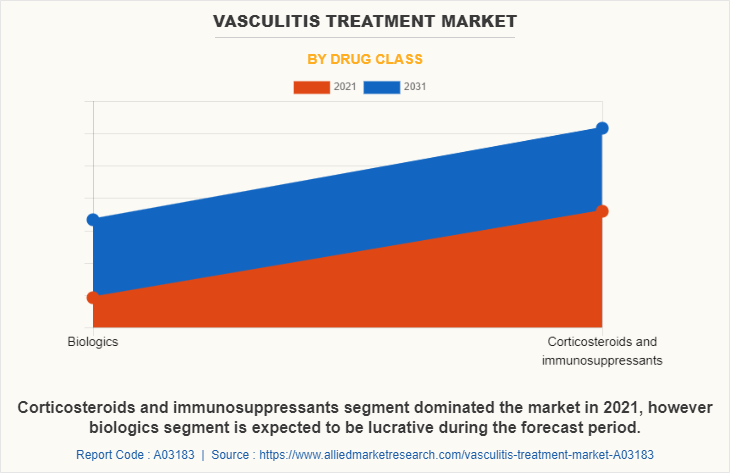
By disease type, the market is divided into small & medium vessel vasculitis, and large vessel vasculitis. The small & medium vessel vasculitis segment dominated the vasculitis treatment market size in 2021, and is expected to witness highest CAGR during the forecast period owing to higher incidence of vasculitis diseases as well as the availability of treatment for them.
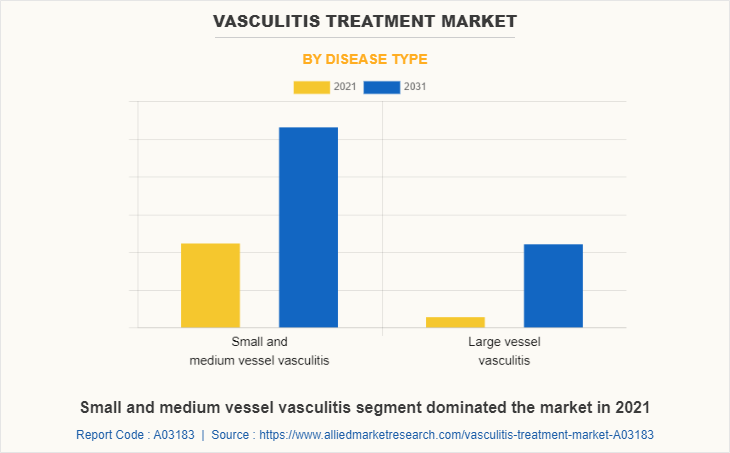
By distribution channel, the market is divided into hospital pharmacies, drug store & retail pharmacies, and online pharmacies. The hospital pharmacies segment dominated the vasculitis treatment market share in 2021, owing to availability of all medications used in hospitals and the reimbursement policies in developing countries, which pay for the high prices of vasculitis medications. The drug store & retail pharmacies segment is expected to witness highest CAGR during the forecast period, owing to maintenance of treatment for a longer duration and easy availability of drugs.
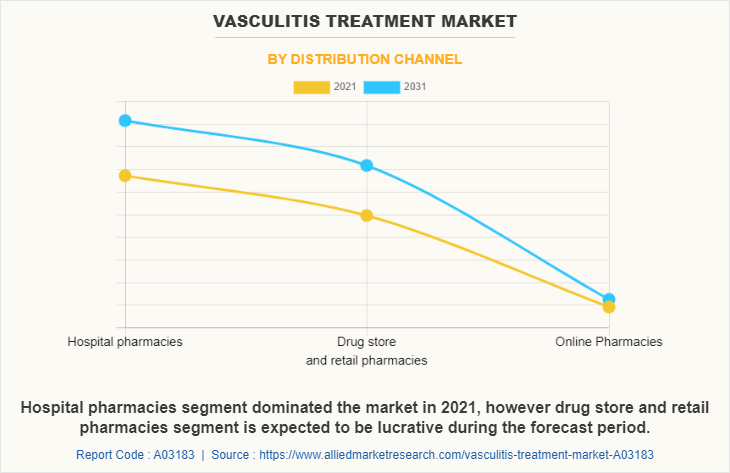
North America accounted for a majority of the global vasculitis treatment market share in 2021, and is anticipated to remain dominant during the forecast period. This is attributed to technological advancements in vasculitis treatment industry, and presence of key and robust hospital infrastructure in the region. However, Asia-Pacific is anticipated to witness notable growth, development of healthcare infrastructure, and increase in investments projects in the region.
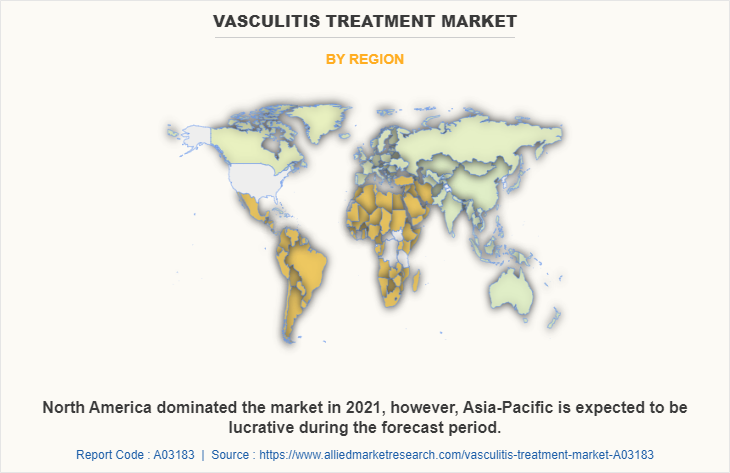
The major players profiled in the vasculitis treatment industry report are AbbVie Inc., Amgen Inc., Amneal Pharmaceuticals, Inc., F. Hoffmann-La Roche AG, GlaxoSmithKline plc, InflaRx NV, Novartis AG, Pfizer Inc., Staidson Biopharma Inc., and Teva Pharmaceuticals Industries Ltd.
Key Benefits For Stakeholders
- This report provides a quantitative analysis of the market segments, current trends, estimations, and dynamics of the vasculitis treatment market analysis from 2021 to 2031 to identify the prevailing vasculitis treatment market opportunities.
- The market research is offered along with information related to key drivers, restraints, and opportunities.
- Porter's five forces analysis highlights the potency of buyers and suppliers to enable stakeholders make profit-oriented business decisions and strengthen their supplier-buyer network.
- In-depth analysis of the vasculitis treatment market segmentation assists to determine the prevailing market opportunities.
- Major countries in each region are mapped according to their revenue contribution to the global market.
- Market player positioning facilitates benchmarking and provides a clear understanding of the present position of the market players.
- The report includes the analysis of the regional as well as global vasculitis treatment market trends, key players, market segments, application areas, and market growth strategies.
Vasculitis Treatment Market Report Highlights
| Aspects | Details |
| Market Size By 2031 | USD 350.1 million |
| Growth Rate | CAGR of 3.4% |
| Forecast period | 2021 - 2031 |
| Report Pages | 275 |
| By Distribution Channel |
|
| By Drug Class |
|
| By Disease Type |
|
| By Region |
|
| Key Market Players | Glaxosmithkline plc, ChemoCentryx, F. Hoffmann-La Roche Ltd, Pfizer Inc., Amneal Pharmaceuticals, Inc., InflaRx N.V, Teva Pharmaceutical Industries Ltd., AbbVie, AstraZeneca plc, Novartis AG |
Analyst Review
This section provides opinions of top level CXOs in the global vasculitis treatment market. According to the insights of CXOs, leading companies in the market and development of advanced & reliable vasculitis treatment drugs are attributed to drive the market growth. Furthermore, increase in demand for better healthcare services is expected to propel the vasculitis treatment market.
The market has drawn the interest of the healthcare industry, owing to increase in chronic & lifestyle-related diseases, rise in geriatric population, and surge in prevalence of vasculitis. In addition, rise in R&D investments by the government in the healthcare sector propels the growth of the market. However, lack of awareness, expired patents, side effects, and stringent regulations for anti-inflammatory drugs usage are projected to hinder the market growth. On the contrary, rise in adoption of biologics and increase in use of corticosteroids drugs are expected to offer remunerative opportunities for the expansion of the vasculitis treatment market. In addition, increase in product approval for treatment of vasculitis is expected to boost the market growth in the near future
Shift toward the adoption rate of biologics and its development is a key trend of the market.
The corticosteroids & immunosuppressants segment is leading in 2021, and biologics segment is expected to witness development in forecast period.
2021 is the base year of vasculitis treatment market.
AbbVie Inc., Amgen Inc., Amneal Pharmaceuticals, Inc., F. Hoffmann-La Roche AG, GlaxoSmithKline plc, InflaRx NV, Novartis AG, Pfizer Inc., Staidson Biopharma Inc., and Teva Pharmaceuticals Industries Ltd., are the top companies to hold the market share in vasculitis treatment.
North America is the largest regional market for vasculitis treatment.
The global vasculitis treatment market was valued at $250.09 million in 2021, and is estimated to reach $350.09 million by 2031, growing at a CAGR of 3.4% from 2022 to 2031.
2022 to 2031 is the forecast period of vasculitis treatment market.
Loading Table Of Content...


